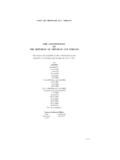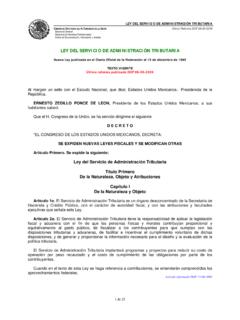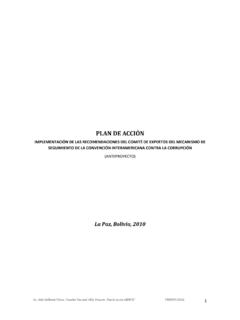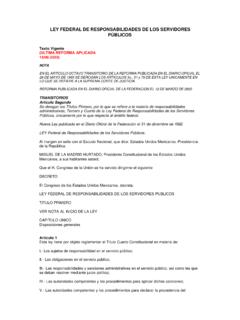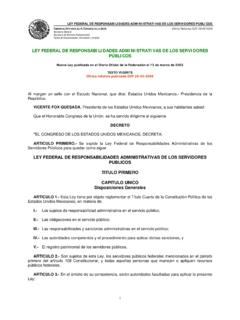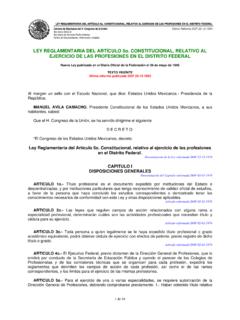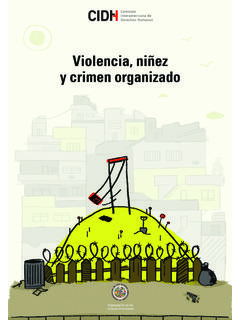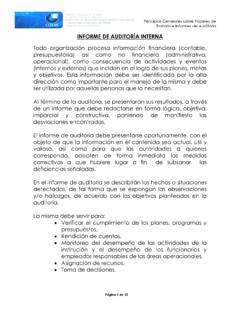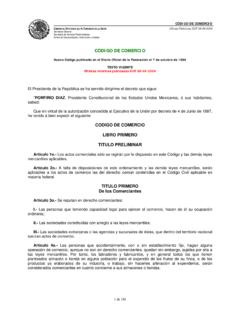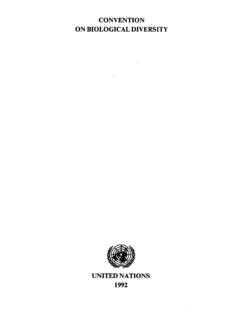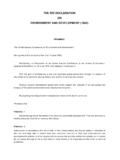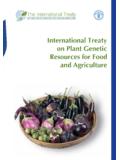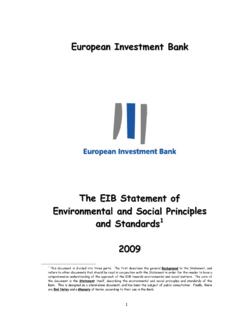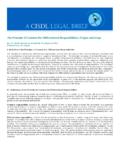Transcription of INTER-AMERICAN CONVENTION ON PROTECTING …
1 INTER-AMERICAN CONVENTION ON PROTECTING THE HUMAN RIGHTS OF OLDER PERSONS INTER-AMERICAN CONVENTION ON PROTECTING THE HUMAN RIGHTS OF OLDER PERSONS preamble The States Parties to the present CONVENTION , Recognizing that unqualified respect for human rights has been enshrined in the american Declaration of the Rights and Duties of Man and in the Universal Declaration of Human Rights and reaffirmed in other international and regional instruments; Reiterating the intention of consolidating, within the framework of democratic institutions, a system of individual liberty and social justice founded upon respect for the fundamental rights of persons; Bearing in mind that, pursuant to the Universal Declaration of Human Rights and the american CONVENTION on Human Rights, the ideal of a free human being, free from fear and poverty can only be achieved if conditions are created that enable each individual to enjoy their economic, social, and cultural rights, as well as their civil and political rights; Reaffirming that all human rights and fundamental freedoms are universal, indivisible, interdependent, and interrelated, as well as the obligation to eliminate all forms of discrimination, in particular, discrimination for reasons of age.
2 Underscoring that older persons have the same human rights and fundamental freedoms as other persons and that those rights, including the right not to be subjected to age-based discrimination nor any form of violence, are rooted in the dignity and equality inherent in all human beings; Recognizing also that, as a person ages, they should continue to enjoy a full, independent, and autonomous life, health, safety, integration, and active participation in the economic, social, cultural and political spheres of their society; Recognizing the need to address matters of old age and ageing from a human-rights perspective that recognizes the valuable current and potential contributions of older persons to the common good, to cultural identity, to the diversity of their communities, to human, social, and economic development, and to the eradication of poverty.
3 Recalling what has been established in the United Nations Principles for Older Persons (1991), the Proclamation on Ageing (1992), and the Political Declaration and Madrid International Plan of Action on Ageing (2002), as well as in such regional instruments as the Regional Strategy for the Implementation in Latin America and the Caribbean of the Madrid International Plan of Action on Ageing (2003), the Brasilia Declaration (2007), the Plan of Action on the Health of Older Persons, including Active and Healthy Aging (2009) of the Pan american Health Organization, the Declaration of Commitment of Port of Spain (2009), and the San Jos Charter on the Rights of Older Persons in Latin America and the Caribbean (2012); Determined to incorporate and prioritize the subject of ageing in public policy, and to raise and allocate the human, material, and financial resources needed to achieve appropriate implementation and evaluation of the special measures undertaken; Reaffirming the value of solidarity and complementarity in international and regional cooperation to promote the human rights and fundamental freedoms of older persons; Actively supporting the incorporation of a gender perspective into all policies and programs designed to ensure the effective exercise of the rights of older persons and underscoring the need to eliminate all forms of discrimination.
4 Convinced of the importance of facilitating the formulation and enforcement of laws and programs to prevent abuse, abandonment, negligence, and mistreatment of and violence against older persons, and of the need to have national mechanisms that protect their human rights and fundamental freedoms; Convinced also that the adoption of a broad, comprehensive CONVENTION will contribute significantly to PROTECTING , promoting, and ensuring the full enjoyment and exercise of the rights of older persons and to fostering an active ageing process in all regards; Have agreed to sign the following INTER-AMERICAN CONVENTION on PROTECTING the Human Rights of Older Persons (hereinafter, the CONVENTION ). CHAPTER I PURPOSE, SCOPE, AND DEFINITIONS Article 1 Purpose and scope The purpose of this CONVENTION is to promote, protect and ensure the recognition and the full enjoyment and exercise, on an equal basis, of all human rights and fundamental freedoms of older persons, in order to contribute to their full inclusion, integration, and participation in society.
5 Nothing in this CONVENTION shall be interpreted as placing limits on broader or additional rights or benefits recognized to older persons in international law or the domestic laws of States Parties. Where the exercise of any of the rights or freedoms referred to in this CONVENTION is not already ensured by legislative or other provisions, States Parties undertake to adopt, in accordance with their constitutional processes and the provisions of this CONVENTION , such legislative and other measures as may be necessary to give effect to those rights or freedoms. The States Parties may only establish restrictions or limitations on the enjoyment and exercise of the rights established in this CONVENTION by means of laws promulgated for the purpose of preserving the general welfare in a democratic society and only to the extent that they are not incompatible with the purposes and reasons underlying those rights.
6 The provisions of the present CONVENTION shall apply to all parts of federal States without limitations or exceptions. Article 2 Definitions For the purposes of this CONVENTION the following definitions shall apply: Abandonment : Lack of action, deliberate or not, to comprehensively care for an older person s needs, which may jeopardize their life or physical, psychological, or moral integrity. Palliative care : Active, comprehensive, and interdisciplinary care and treatment of patients whose illness is not responding to curative treatment or who are suffering avoidable pain, in order to improve their quality of life until the last day of their lives. Central to palliative care is control of pain, of other symptoms, and of the social, psychological, and spiritual problems of the older person.
7 It includes the patient, their environment, and their family. It affirms life and considers death a normal process, neither hastening nor delaying it. Discrimination : Any distinction, exclusion, or restriction with the purpose or effect of hindering, annulling, or restricting the recognition, enjoyment, or exercise, on an equal basis, of human rights and fundamental freedoms in the political, cultural, economic, social, or any other sphere of public and private life. Multiple discrimination : Any distinction, exclusion, or restriction toward an older person, based on two or more discrimination factors. Age discrimination in old age : Any distinction, exclusion, or restriction based on age, the purpose or effect of which is to annul or restrict recognition, enjoyment, or exercise, on an equal basis, of human rights and fundamental freedoms in the political, cultural, economic, social, or any other sphere of public and private life.
8 Ageing : A gradual process that develops over the course of life and entails biological, physiological, psychosocial, and functional changes with varying consequences, which are associated with permanent and dynamic interactions between the individual and their environment. Active and healthy ageing : The process of optimizing opportunities for physical, mental, and social well-being, participation in social, economic, cultural, spiritual, and civic affairs, and protection, security, and care in order to extend healthy life expectancy and quality of life for all people as they age, as well as to allow them to remain active contributors to their families, peers, communities, and nations. It applies both to individuals and to population groups.
9 Abuse : A single or repeated act or omission to the detriment of an older person that harms their physical, mental, or moral integrity and infringes the enjoyment or exercise of their human rights and fundamental freedoms, regardless of whether or not it occurs in a relationship of trust. Negligence : Involuntary error or unintentional fault, including, inter alia, neglect, omission, abandonment, and failure to protect, that causes harm or suffering to an older person, in either the public or the private sphere, in which normal necessary precautions proportional to the circumstances have not been taken. Older person : A person aged 60 or older, except where legislation has determined a minimum age that is lesser or greater, provided that it is not over 65 years.
10 This concept includes, among others, elderly persons. Older person receiving long-term care services : One who resides temporarily or permanently in a regulated, public, private or mixed establishment, which provides quality comprehensive social and health care services, including long-term facilities for older persons with moderate or severe dependency, who cannot receive care in their home. Integrated social and health care services : Institutional benefits and entitlements to address the health care and social needs of older persons with a view to guaranteeing their dignity and well-being and to promoting their independence and autonomy. Household unit or home : A group of individuals who live in the same dwelling, share the main meals, and address the common basic needs together, without necessarily being relatives.
